- Home
- Harlan Coben
Hold Tight (2008) Page 26
Hold Tight (2008) Read online
Page 26
"You did the right thing, calling me."
Nash looked at his former brother-in-law. You say "former" because "ex" implies divorce. Cassandra Lewiston, his beloved wife, had five brothers. Joe Lewiston was both the youngest and her favorite. When their oldest brother, Curtis, was murdered a little more than a decade ago, Cassandra had taken it so hard. She had cried for days and wouldn't get out of bed and sometimes, even though he knew that it was irrational to think such thoughts, Nash wondered if that anguish had made her sick. She grieved so hard over her brother that maybe her immune system had weakened. Maybe cancer is in all of us, those life-draining cells, and maybe they bide their time until our defenses are down and then they make their move.
"I promise I will find out who killed Curtis," Nash had told his beloved.
But he hadn't kept that promise, though that really hadn't mattered to Cassandra. She was not one for vengeance. She just missed her big brother. So he had sworn to her right then and there. He had sworn that he would never let her know this pain again. He would protect those she loved. He would protect them always.
He had promised her that again on her deathbed.
It seemed to bring her comfort.
"You'll be there for them?" Cassandra had asked.
"Yes."
"And they will be there for you too."
He had not replied to that.
Joe came toward him. Nash took in the classroom. In so many ways they had not changed at all from the days he'd been a student. There were still the handwritten rules and the cursive alphabet in both capitals and small letters. There were splashes of color everywhere. Recent artwork was drying on a clothesline.
"Something else happened," Joe said.
"Tell me."
"Guy Novak keeps driving by my house. He slows down and glares. I think he's scaring Dolly and Allie."
"Since when?"
"He's been doing it for about a week now."
"Why didn't you tell me this before?"
"I didn't think it was important. I figured he'd stop."
Nash closed his eyes. "And why do you think it's important now?"
"Because Dolly got really upset when he did it this morning."
"Guy Novak drove by your house today?"
"Yes."
"And you think it's an attempt to harass you?"
"What else would it be?"
Nash shook his head. "We had it wrong from the get-go."
"What do you mean?"
But there was no reason to explain. Dolly Lewiston was still getting the e-mails. That meant one thing. Marianne hadn't sent them out, even though, after suffering so much, she had said that she had.
Guy Novak had.
He thought about Cassandra and his promise. He knew now what he would have to do to take care of this situation.
Joe Lewiston said, "I'm such a fool."
"Listen to me, Joe."
He looked so scared. Nash was glad that Cassandra would never see her baby brother like this. He thought about how Cassandra had been toward the end. She had lost her hair. Her skin was jaundiced. There were open wounds on her scalp and face. She lost control of her bowels. There were times the pain seemed unbearable, but she had made him promise not to interfere. Her lips would purse and her eyes would bulge and it was like steel talons were shredding her from inside. Sores covered the inside of her mouth toward the end so that she couldn't even speak. Nash would sit there and watch and feel the rage.
"It's going to be okay, Joe."
"What are you doing to do?"
"Don't worry about it, okay? It will be fine. I promise."
BETSY Hill waited for Adam in the small patch of woods behind her house.
This overgrown area was on their property, but they'd never bothered to clean it out. She and Ron had talked a few years back about razing it and putting in a pool, but the expense would cause a strain and the twins were still too young. So they never got around to it. Ron had built a fort back here when Spencer was nine. The kids would play on it. There had been an old swing set too, something they bought from Sears. Both had been abandoned years ago, but if she looked close enough, Betsy could still find the scattered nail or rusted piping.
The years passed and then Spencer started hanging back here with some of his friends. Betsy had found beer bottles once. She debated raising this with Spencer, but whenever she tried to broach the subject, he withdrew even more. He was a teen having a beer. What was the big deal?
"Mrs. Hill?"
She turned and saw Adam standing behind her. He had come in through the other side, from the Kadisons' backyard.
"My God," she said, "what happened to you?"
There was swelling on his dirty face. His arm had a huge bandage wrapped around it. His shirt was torn.
"I'm fine."
Betsy had heeded his warning and had not called his parents. She feared blowing this opportunity. Maybe that was wrong, but she had made so many wrong decisions over the past few months, one more barely seemed relevant.
Still, her next words to him were "Your parents are so worried."
"I know."
"What happened, Adam? Where have you been?"
He shook his head. Something about the way he did that reminded Betsy of his father. As kids get older, you see that more--not just looking like their parents but locked into the same mannerisms. Adam was big now, taller than his dad, almost a man.
"I guess that picture has been on the memorial page for a long time," Adam said. "I never go there."
"You don't?"
"No."
"Can I ask why?"
"It isn't Spencer to me. You know? I mean, I don't even know those girls who set it up. I got enough reminders. So I don't look at it."
"Do you know who took the picture?"
"DJ Huff, I think. I mean, I can't be sure because I'm just in the background. I'm looking away. But DJ uploaded a lot of pictures to that site. Probably just uploaded them all and didn't even realize it was from that night."
"What happened, Adam?"
Adam started to cry. She had been thinking just a few seconds ago that he seemed so close to manhood. Now the man vanished, and the boy was back.
"We had a fight."
Betsy just stood there. Maybe six feet separated them, but she could feel the hum of his blood.
"That was how he got that bruise on his face," Adam said.
"You punched him?"
Adam nodded.
"You were his friend," Betsy said. "Why would you fight?"
"We were drinking and getting high. It was over a girl. Things got out of hand. We pushed and then he threw a punch. I ducked it and then I hit him in the face."
"Over a girl?"
Adam lowered his eyes.
"Who else was there?" she asked.
Adam shook his head. "It doesn't matter."
"It matters to me."
"It shouldn't. I'm the one he had the fight with."
Betsy tried to imagine it. Her son. Her beautiful son and his last day on earth and his best friend in the world had struck him in the face. She tried to keep her tone even, but that wasn't happening. "I don't understand any of this. Where were you?"
"We were supposed to go to the Bronx. There's this place there. They let kids our age party."
"The Bronx?"
"But before we went, Spencer and I had the fight. I hit him and called him horrible names. I was so mad. And then he ran away. I should have gone after him. I didn't. I let him go. I should have known what he would do."
Betsy Hill just stood there, numb. She remembered what Ron had said, about how no one forced their son to steal vodka and pills from the house.
"Who killed my boy?" she asked.
But she knew.
She had known from the beginning. She had sought explanations for the unexplainable and maybe she would get one, but human behavior was usually much more complex. You find two siblings who were raised in the exact same manner and one will end up sweet and one will be a killer.
Some people will chalk that up to "hardwiring," to nature over nurture, but then sometimes it isn't even that--it is just some random event that alters lives, something in the wind that mixes with your particular brain chemistry, anything really, and then after the tragedy, we look for explanations and maybe we find some, but it is just theorizing after the fact.
"Tell me what happened, Adam."
"He tried to call me later," Adam said. "Those were those calls. I saw it was him. And I didn't answer. I just let it go into voice mail. He was already so stoned. He was depressed and down and I should have seen it. I should have forgiven him. But I didn't. That was his last message to me. He said he was sorry and he knew the way out. He had thought about suicide before. We all talk about that. But with him it was different. It was more serious. And I fought with him. I called him names and said I'd never forgive him."
Betsy Hill shook her head.
"He was a good kid, Mrs. Hill."
"He was the one who took the drugs from our house, from our medicine cabinet..." she said, more to herself than to him.
"I know. We all did."
His words rattled her, made it impossible to think. "A girl? You fought over a girl?"
"It was my fault," Adam said. "I lost control. I didn't look out for him. I listened to the messages too late. I got to the roof as soon as I could. But he was dead."
"You found him?"
He nodded.
"And you never said anything?"
"I was gutless. But not anymore. It ends now."
"What ends?"
"I'm so sorry, Mrs. Hill. I couldn't save him."
Then Betsy said, "Neither could I, Adam."
She took a step toward him, but Adam shook his head.
"It ends now," he said again.
Then he took two steps backward, turned, and ran away.
Chapter 33.
PAUL Copeland stood in front of a plethora of network microphones and said, "We need your help in finding a missing woman named Reba Cordova."
Muse watched from the side of the stage. The monitors flashed an achingly sweet photograph of Reba on the screen. Her smile was the kind that made you smile too, or conversely, in a situation like this, ripped your heart right down the middle. There was a phone number on the bottom of the screen.
"We also need help in locating this woman."
Now they flashed the photograph from the Target store surveillance video.
"This woman is a person of interest. If you have any information, please call the number below."
The nut jobs would start in now, but in this situation, the potential pros outweighed, in Muse's view, the cons. She doubted anyone would have seen Reba Cordova, but there was a real chance that someone might recognize the woman in the surveillance photo. That was what Muse was hoping anyway.
Neil Cordova stood next to Cope. In front of him were his and Reba's two little girls. Cordova kept his chin high, but you could still see the tremble. The Cordova girls were beautiful and haunting and all eyes, like something you'd see staggering away from a burned-out building in a war newsreel. The networks, of course, loved this--the photogenic grieving family. Cope had told Cordova that he didn't have to attend or he could attend by himself without the kids. Neil Cordova had shaken that off.
"We need to do all we can to save her," Cordova had told Cope, "or those girls will look back and wonder."
"It's going to be traumatic," Cope replied.
"If their mother is dead, they'll go through hell no matter. At least I want them to know that we did all we could."
Muse felt her phone vibrate. She checked and saw it was Clarence Morrow calling from the morgue. About damn time.
"The body belongs to Marianne Gillespie," Clarence said. "The ex-husband is positive."
Muse stepped up a little, just so that Cope could see her. When he glanced toward her, she gave a small nod. Cope turned back to the microphone and said, "We have also identified a body that may be connected to Ms. Cordova's disappearance. A woman named Marianne Gillespie..."
Muse turned back to her call. "You questioned Novak?"
"We did. I don't think he's involved, do you?"
"No."
"He had no motive. His girlfriend isn't the woman in the surveillance tape, and he doesn't match the description of the guy in the van."
"Take him home. Let him tell his daughter in peace."
"On our way. Novak already called the girlfriend to make sure she kept the girls away from the news until he gets back."
Back on the monitor a photograph of Marianne Gillespie appeared. Weirdly enough, Novak did not have any old photos of his ex, but Reba Cordova had visited Marianne in Florida last spring and taken some snapshots. The picture was taken by the pool, Marianne working a bikini, but they'd cropped it into a headshot for the cameras. Marianne had been something of a bombshell, Muse noted, albeit one who had probably seen better days before the hard living. Things weren't as tight as they might have once been, but you could still see she had it.
Neil Cordova finally stepped up to speak. The camera flashes created the strobe that always shocked the uninitiated. Cordova blinked through it. He seemed calmer now, putting on a game face. He told everyone that he loved his wife and that she was a wonderful mother and if anyone had information, could they please call the number on the screen?
"Psst."
Muse turned. It was Frank Tremont. He waved her to come toward him.
"We got something," he said.
"Already?"
"A widow who used to be married to a Hawthorne cop called. She says the woman in the surveillance photo lives alone downstairs. Says the woman is from someplace overseas and that her name is Pietra."
O N his way out of the school, Joe Lewiston checked his mailbox at the main office.
There was yet another flyer and personal note from the Loriman family to help find a donor for their son, Lucas. Joe had never had any of the Loriman kids, but he'd seen the mother around. Male teachers might pretend that they are above it, but they noticed the hot moms. Susan Loriman was one of them.
The flyer--the third he'd seen--said that next Friday they would have a "medical professional" coming through the school to take blood tests.
Please find it in your heart to help save Lucas's life...
Joe felt terrible. The Lorimans were working feverishly to save their child's life. Mrs. Loriman had e-mailed and called him, urging him to help: "I know you've never taught any of my kids, but everyone in the school looks up to you as a leader," and Joe had thought, selfishly because all humans are selfish, that maybe it would help his standing since the XY-Yasmin controversy or at the very least assuage his own guilt. He thought about his own child, imagined little Allie in a hospital with tubes running out of her, sick and in pain. That thought should have put his problems into perspective, but it didn't. Someone is always worse off than you. That never seemed like much comfort.
He drove and thought about Nash. Joe still had three older brothers alive, but he relied on Nash more than any of them. Nash and Cassie had seemed like an unlikely mix, but when they were together, it was as though they were one entity. He heard that was how it sometimes worked, but he had never really seen it before or since. Lord knows he and Dolly didn't have it.
Corny as it sounded, Cassie and Nash had truly been two becoming one.
When Cassie died, it was beyond devastating. You just never thought it would happen. Even after the diagnosis. Even after watching the early horrifying effects of the illness. You somehow thought that Cassie would pull through. It shouldn't have been a shock by the time she succumbed. But it was.
Joe saw Nash change more than any of them--or maybe, when two are forced to become one again, something has to give. There was a coldness to Nash that Joe now found oddly comforting because there were so few Nash cared about. Outwardly warm people pretend that they are there for everyone, but when it really counted, like now, a man wants to call on a strong friend who only has his interest at he
art, who could give a damn about right or wrong, who just wanted to make sure the one he cared about was safe.
That was Nash.
"I promised Cassandra," Nash had explained to him after the funeral. "I will protect you."
With anyone else that would have sounded bizarre or discomforting, but with Nash, you knew that he meant it and that he would do whatever was in his almost supernatural power to keep his word. It was scary and exhilarating and for someone like Joe, the unathletic son ignored by his demanding father, it meant a lot.
When Joe walked in the door, he saw that Dolly was on the computer. She had a funny expression on her face and Joe felt his stomach drop.
"Where were you?" Dolly asked.
"At school."
"Why?"
"Just some work I wanted to catch up on."
"My e-mail still isn't working."
"I'll take another look at it."
Dolly stood up. "Do you want some tea?"
"That would be nice, thanks."
She kissed his cheek. Joe sat at the computer. He waited until she was out of the room, then he signed into his account. He was about to check his e-mails when something on his home page caught his eye.
"Lead photos" from the news circulated on his front page. There was international news, followed by local news, sports and then entertainment. It was the local news picture that had caught his eye. The picture was gone now, replaced with something about the New York Knicks.
Joe hit the back arrow and found the picture again.
It was a photograph of a man with his two little girls. He recognized one of them. She wasn't one of his students, but she went to his school. Or at least she looked like a girl who did. He clicked on the story. The headline read:
LOCAL WOMAN MISSING
He saw the name Reba Cordova. He knew her. She had been on the school library committee where Joe had been faculty liaison. She was vice president of the HSA and he remembered her smiling face at the back door when the children were let out.
She was missing?
Then he read the part beneath that, about the possible connection to a corpse recently found in Newark. He read the name of the murder victim and felt the breath squeeze out of him.
Oh dear Lord, what had he done?

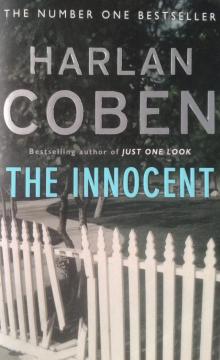 The Innocent
The Innocent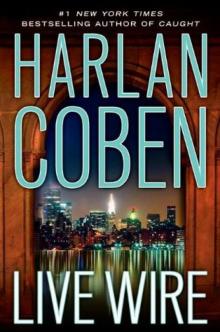 Live Wire
Live Wire Play Dead
Play Dead Drop Shot
Drop Shot Seconds Away
Seconds Away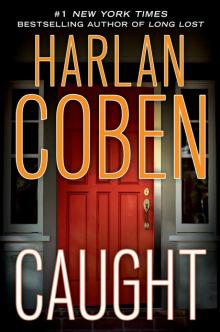 Caught
Caught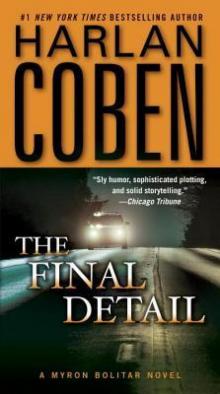 The Final Detail
The Final Detail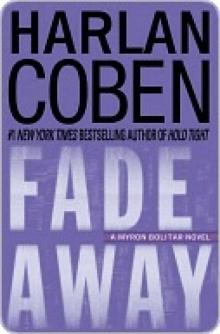 Fade Away
Fade Away Home
Home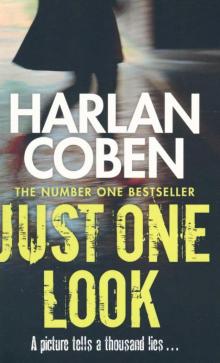 Just One Look
Just One Look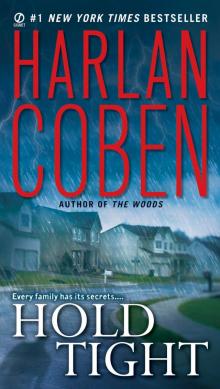 Hold Tight
Hold Tight Fool Me Once
Fool Me Once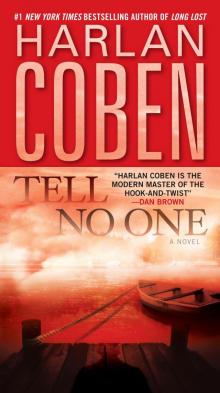 Tell No One
Tell No One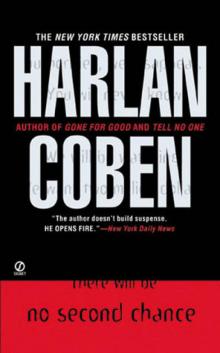 No Second Chance
No Second Chance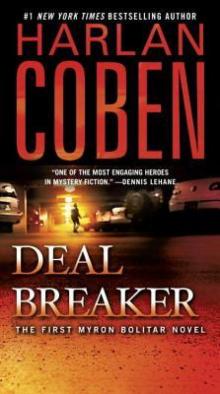 Deal Breaker
Deal Breaker Long Lost
Long Lost One False Move
One False Move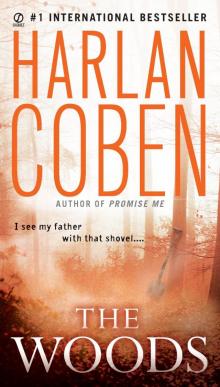 The Woods
The Woods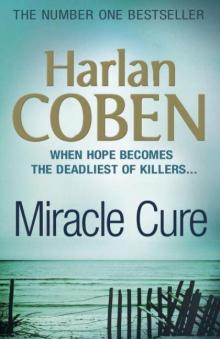 Miracle Cure
Miracle Cure Found
Found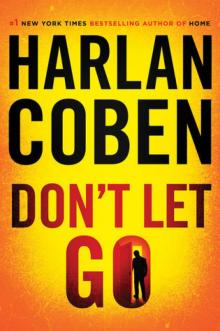 Don't Let Go
Don't Let Go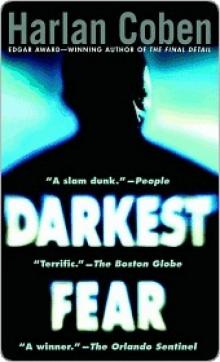 Darkest Fear
Darkest Fear The Stranger
The Stranger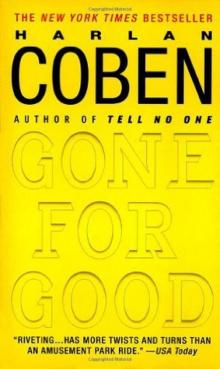 Gone for Good
Gone for Good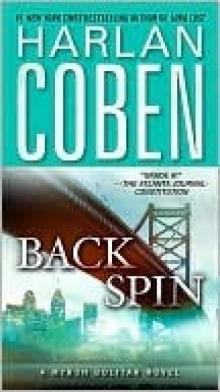 Back Spin
Back Spin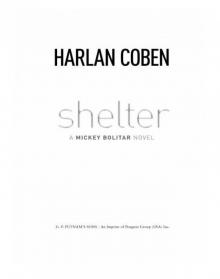 Shelter
Shelter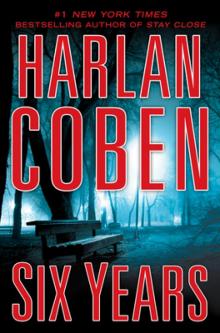 Six Years
Six Years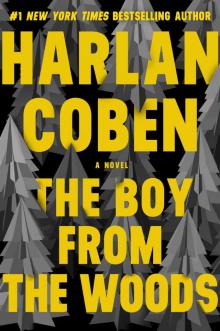 The Boy from the Woods
The Boy from the Woods Missing You
Missing You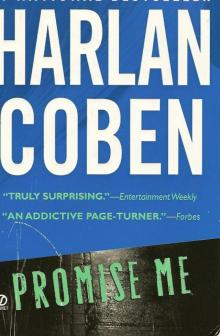 Promise Me mb-8
Promise Me mb-8 The Final Detail: A Myron Bolitar Novel
The Final Detail: A Myron Bolitar Novel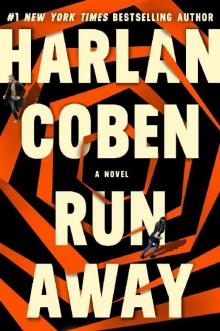 Run Away
Run Away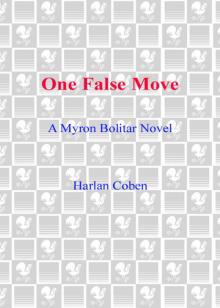 One False Move: A Myron Bolitar Novel
One False Move: A Myron Bolitar Novel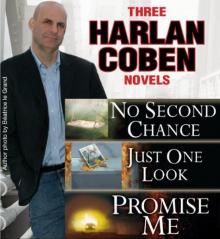 Three Harlan Coben Novels
Three Harlan Coben Novels the Woods (2007)
the Woods (2007) Tell No One (2001)
Tell No One (2001) the Innocent (2005)
the Innocent (2005)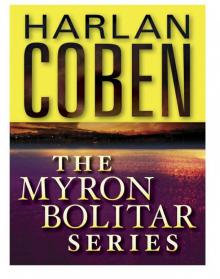 The Myron Bolitar Series 7-Book Bundle
The Myron Bolitar Series 7-Book Bundle Gone for Good (2002)
Gone for Good (2002) Caught (2010)
Caught (2010) Hold Tight (2008)
Hold Tight (2008)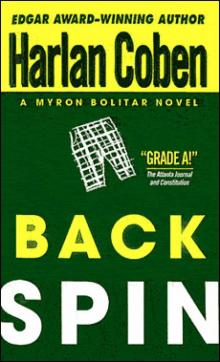 04 - Back Spin
04 - Back Spin Miracle Cure (1991)
Miracle Cure (1991) Harlan Coben 3 Novel Collection
Harlan Coben 3 Novel Collection Just One Look (2004)
Just One Look (2004)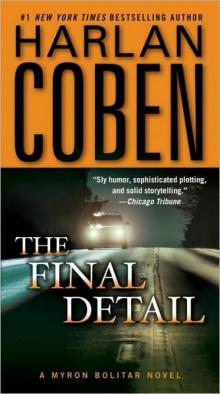 The Final Detail mb-6
The Final Detail mb-6 Play Dead (2010)
Play Dead (2010)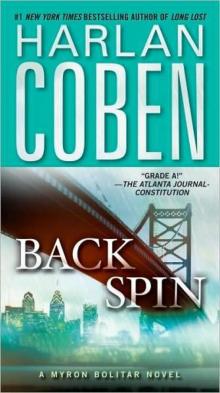 Back Spin mb-4
Back Spin mb-4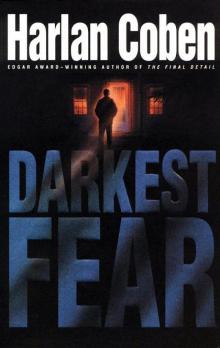 Darkest Fear mb-7
Darkest Fear mb-7